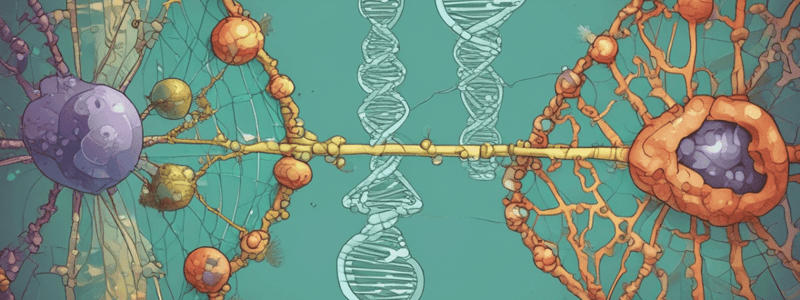Podcast
Questions and Answers
Match the following biology subdisciplines with their descriptions:
Match the following biology subdisciplines with their descriptions:
Cell Biology = Focuses on the structure and function of cells DNA and Genetics = Study of genetic material and its impact on traits Evolutionary Biology = Explores origins and diversification of species Ecology = Study of interactions between organisms and their environment
Match the following biological processes with their descriptions:
Match the following biological processes with their descriptions:
Metabolism = Cellular process involving energy production Reproduction = Process of generating offspring Communication = Transfer of information between cells Endosymbiosis = Integration of free-living bacteria into eukaryotic cells
Match the following genetic concepts with their definitions:
Match the following genetic concepts with their definitions:
Genes = Units of heredity that carry instructions Genetic variation = Differences in genetic makeup within a population CRISPR/Cas9 = Gene editing technique with potential applications in medicine and agriculture Regulation of genes = Control mechanisms for gene expression
Match the following advancements in biology with their potential impacts:
Match the following advancements in biology with their potential impacts:
Match the following branches of biology with their primary focus:
Match the following branches of biology with their primary focus:
Match the following areas of study with their applications:
Match the following areas of study with their applications:
Match the following biology subdisciplines with their research subjects:
Match the following biology subdisciplines with their research subjects:
Match the following biology branches with their interdisciplinary nature:
Match the following biology branches with their interdisciplinary nature:
Flashcards are hidden until you start studying
Study Notes
Biology is the scientific study of life, from the intricacies of cells to the complex interactions of ecosystems. It is a vast and interconnected field that includes many subdisciplines, each focusing on different aspects of life. In this article, we will explore some of the key topics within biology and the research that is driving our understanding of the living world.
-
Cell Biology: This branch of biology focuses on the structure and function of cells, the fundamental units of life. Researchers study cellular processes such as metabolism, reproduction, and communication, as well as the organization of cells into tissues and organs. One interesting aspect of cell biology is the study of organelles, such as mitochondria and chloroplasts, which were once free-living bacteria that became part of eukaryotic cells through a process called endosymbiosis.
-
DNA and Genetics: The study of DNA and genetics is about understanding the genetic material that carries the instructions for the development and function of all living organisms. Research in this area involves the study of genes, their structure, and how they are regulated, as well as the impact of genetic variation on traits and disease. Recent advancements in genetics include the development of gene editing techniques like CRISPR/Cas9, which have the potential to revolutionize medicine and agriculture.
-
Evolutionary Biology: This field of biology explores the origins and diversification of species over time. Evolutionary biologists study the processes that drive change, such as natural selection, genetic drift, and gene flow, as well as the patterns of biodiversity and the relationships between different species. One area of interest is the study of trade-offs in life history, which can provide insights into the evolution of complex traits and behaviors.
-
Neurobiology: This branch of biology focuses on the study of the nervous system, particularly the brain and its functions. Research in this area includes understanding the structure and function of neurons, the connections between them, and how these networks generate complex behaviors and cognitive processes. Neurobiology has important applications in fields such as medicine, psychology, and artificial intelligence.
-
Ecology and Environmental Biology: This field of biology examines the interactions between organisms and their environment, including the relationships between species and the processes that shape communities and ecosystems. Researchers study the distribution and abundance of species, the dynamics of populations, and the impacts of human activities on the natural world. Ecology and environmental biology have important applications in conservation, resource management, and sustainable development.
-
Molecular Biology: This subdiscipline of biology focuses on the study of biological molecules, particularly proteins and nucleic acids, and their functions in cellular processes. Research in this area includes understanding the structure and function of proteins, the regulation of gene expression, and the study of molecular interactions and signaling pathways.
Biology is a multidisciplinary field that draws on a wide range of techniques and approaches to understand the complex and diverse world of life. As research continues to advance, our understanding of the living world will only continue to grow.
Studying That Suits You
Use AI to generate personalized quizzes and flashcards to suit your learning preferences.




